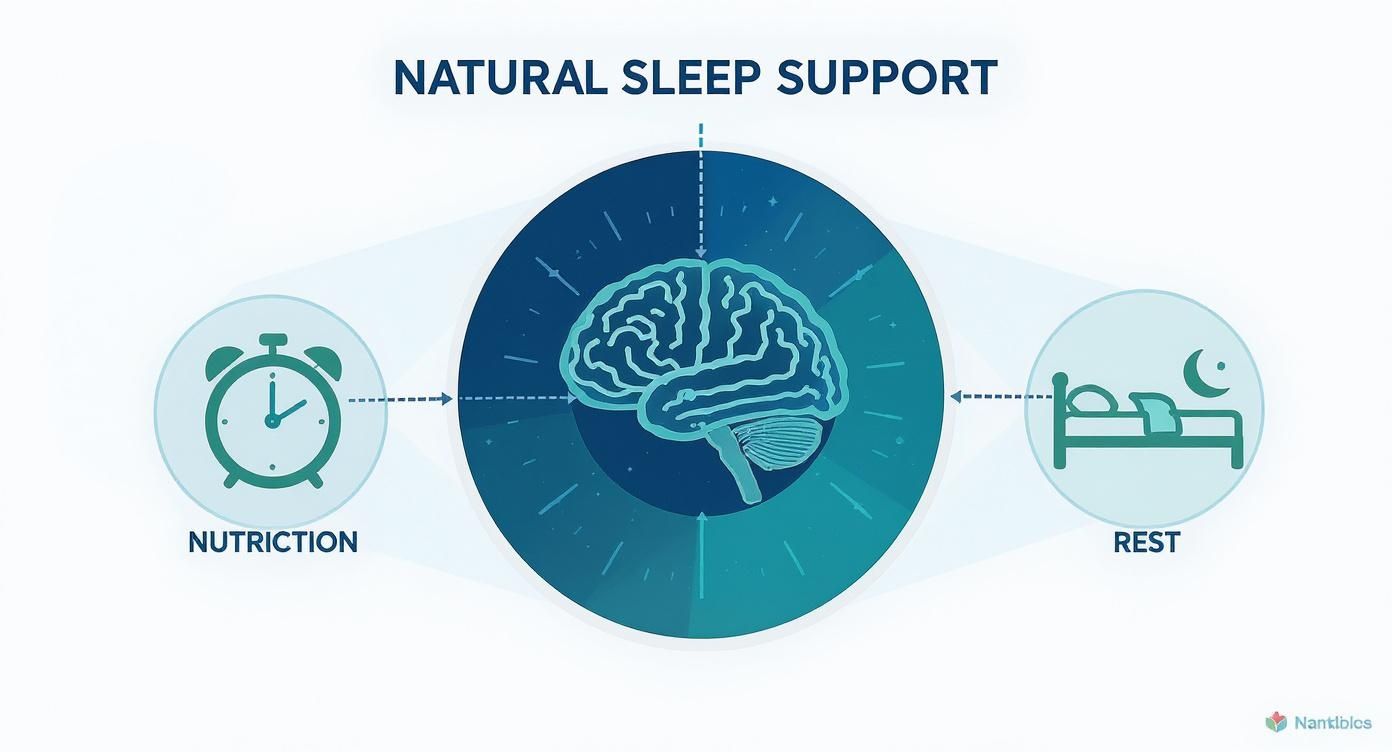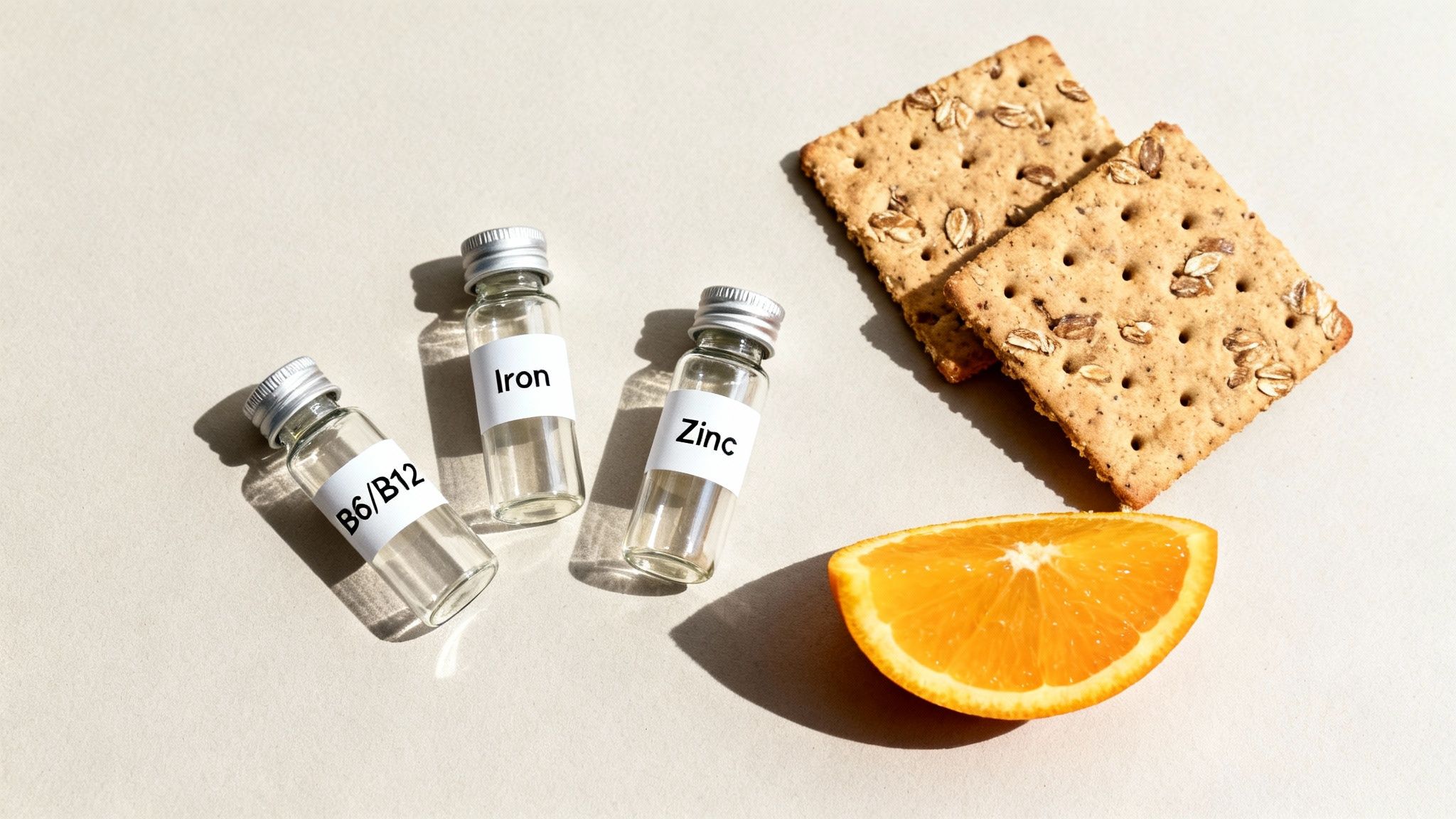
A Guide to Vitamins for Good Sleep
Share
Tired of restless nights? The answer might be hiding in your diet. Specific nutrients, particularly key players like magnesium and vitamin D, are the essential tools your body uses to manage its natural sleep-wake cycle, helping you sink into a deeper, more restorative rest.
Your Guide to Natural Sleep Support
If you spend your nights staring at the ceiling, you're not alone. Millions of us struggle to get the quality sleep we need to feel our best. While there are countless reasons for a bad night's sleep, one of the most overlooked is the powerful link between what we eat and our body's ability to switch off.
Think of it less like a magic pill and more like giving your body the raw materials it needs to do its job properly. This guide goes beyond the usual advice to show you exactly how certain vitamins and minerals are fundamental to your internal clock. We'll look at how common gaps in our diet can throw this delicate system out of balance, making it harder to fall and stay asleep.
This is especially true for those of us in the UK. Less sunshine often means lower levels of key sleep-regulating nutrients like Vitamin D, which can have a real knock-on effect on our rest.
Why Nutrients Matter for Rest
Your body doesn't just power down when you sleep; it kicks into a complex, active state of repair. This whole process hinges on a precise sequence of hormonal and neurological signals, and key nutrients are the building blocks that make it all happen.
- Hormone Production: Nutrients like the B vitamins are vital for creating melatonin, the hormone that tells your body it's time for bed.
- Nervous System Regulation: Minerals such as magnesium help to calm your nervous system, gently preparing your body and mind for rest.
- Muscle Relaxation: A shortfall in certain minerals can lead to nighttime muscle cramps or that antsy, restless feeling, physically stopping you from settling down.
By understanding the specific jobs these nutrients do, you can start to figure out any potential shortfalls and build a solid nutritional foundation for better sleep. It's all about working with your body's natural rhythms, not against them.
Here's a quick look at the main players we'll be discussing.
Key Nutrients for Sleep at a Glance
This table offers a snapshot of the top vitamins and minerals for better rest, their main role, and where you can find them in your food.
| Nutrient | Primary Role in Sleep | Common Food Sources |
|---|---|---|
| Magnesium | Calms the nervous system and relaxes muscles. | Leafy greens, nuts, seeds, dark chocolate. |
| Vitamin D | Helps regulate circadian rhythm. | Fatty fish, fortified milk, sunlight exposure. |
| B Vitamins | Essential for melatonin production. | Meat, poultry, fish, eggs, whole grains. |
| Calcium | Aids in the use of tryptophan to make melatonin. | Dairy products, fortified cereals, leafy greens. |
| Omega-3 | Supports melatonin production and may reduce inflammation that disrupts sleep. | Fatty fish (salmon, mackerel), walnuts, flaxseeds. |
Getting your nutrition right is a brilliant first step, but remember it's just one piece of the puzzle. Other small changes to your routine can make a huge difference, too.
For some extra strategies, check out these five tips for going to sleep quicker to complement your new nutritional focus.
How Nutrients Regulate Your Internal Clock
To really get why certain vitamins are so brilliant for sleep, we first need to chat about your body's internal master clock – what scientists call the circadian rhythm. This isn't just some vague feeling; it's a sophisticated system that sends signals all day long, telling you when to feel sharp and alert, and when it’s time to power down.
Think of it like a beautifully complex orchestra. Hormones like melatonin (the famous "sleep hormone") and neurotransmitters such as serotonin are the star players. But for them to hit all the right notes, they need their instruments to be in perfect working order. That's where nutrients come in.
Vitamins and minerals are the unsung heroes of this process, acting as the essential 'gears' and 'batteries' that keep the whole internal clock ticking along perfectly. If they're missing, the whole performance can go off-key, leaving you staring at the ceiling at 3 a.m.
The Role of Key Nutrients in Sleep Production
It's amazing how many of your body's sleep processes begin with simple building blocks from the food on your plate. Take melatonin production, for example. It's a step-by-step conversion process that absolutely depends on B vitamins to turn the raw ingredients into that final, sleep-beckoning hormone.
Other minerals are just as important in their supporting roles. Magnesium is a big one; it’s crucial for firing up GABA, a calming neurotransmitter that essentially puts the brakes on a racing mind. Without enough of it, your nervous system might just refuse to switch off, making true relaxation feel like a distant dream.
This handy map shows just how tightly nutrition, your body clock, and proper rest are linked.

As you can see, getting good sleep isn't about finding one magic bullet. It’s about a balanced approach where the right nutrition directly fuels the very mechanisms that control your natural sleep cycle. Grasping this helps explain why certain vitamins for good sleep are so effective.
When your body has all the nutritional tools it needs, it can effortlessly conduct its nightly symphony of rest and repair. A deficiency in even one key nutrient can disrupt the entire rhythm, throwing your sleep schedule into disarray. Now, let’s explore some of the most important nutrients individually.
Vitamin D for Deeper Sleep
We often think of Vitamin D as the 'sunshine vitamin', mainly linked to strong bones. But its influence stretches much further, right into the brain centres that run our sleep-wake cycle. You could think of it as a crucial member of the team managing your internal body clock, helping everything stay on schedule for a good night's rest.
Your brain actually has specific Vitamin D receptors in the very areas that control sleep. When these receptors are active, they help manage the hormones that signal it's time to wind down. If your Vitamin D levels are dipping, this whole communication system can get a bit sluggish, often leading to sleep that feels shorter, more broken, and less refreshing.
This connection is a particularly big deal for those of us living in the UK.
The UK Sunlight Problem
Once autumn rolls around, the sun in the UK just isn't strong enough for our bodies to produce the Vitamin D we need. This seasonal drop often leads to widespread low levels, which can affect a lot more than just our mood.
In the UK, low Vitamin D is incredibly common and has been linked to poorer sleep quality. Research suggests that around 49.5% of UK adults have below-optimal levels. This is a big number, especially as studies continue to show just how vital this vitamin is for sleep regulation. You can dive deeper into the science behind this in the latest findings from Frontiers in Nutrition.
What this means is that for nearly half the year, sunlight alone won't cut it. This is a major reason why so many of us turn to other sources to keep our levels topped up.

When you look into supplements, you'll usually find two main forms: D2 and D3. While both will raise the levels in your blood, Vitamin D3 is widely considered more effective. It’s the same form your body naturally makes from sun exposure, so it's generally the preferred choice for getting your levels back on track efficiently.
For anyone looking to support their sleep cycle, a quality supplement can be a simple, reliable way to bridge that gap. Exploring an option like a straightforward Vitamin D3 2,000 IU supplement can be a great way to ensure you're getting enough, especially during the darker months. Making sure you have enough of this key vitamin is a simple step towards supporting deeper, more restorative rest.
Magnesium: The Ultimate Relaxation Mineral
Often called nature's tranquilliser, magnesium is a powerhouse mineral that’s absolutely essential for getting your body and mind ready for rest. Think of it as a master switch for relaxation; it plays a critical role in calming your entire nervous system down, making it one of the most effective natural aids for achieving deep, restorative sleep.
Its magic lies in a dual-action approach. First, magnesium supports the function of GABA, a neurotransmitter that helps to quieten down brain activity. When your GABA levels are where they should be, your mind is better able to switch off from the day's worries, preventing you from lying awake with racing thoughts. At the same time, it works directly on your muscles, helping them to relax and release tension, which can be a game-changer for preventing disruptive nighttime cramps and restlessness.

Choosing the Right Type of Magnesium
Not all magnesium supplements are created equal, and picking the right one is key to unlocking those sleep benefits without any unwanted side effects.
- Magnesium Glycinate: This is often hailed as the best choice for sleep. It’s highly absorbable and famously gentle on the stomach, making it ideal for promoting calm and relaxation before bed.
- Magnesium Citrate: While also well-absorbed, this form has a mild laxative effect, so it’s better suited for those who also experience constipation.
- Magnesium Oxide: This form is less bioavailable, which is a technical way of saying your body doesn't absorb it as well. You'll more commonly see it used for digestive relief than for sleep support.
For improving sleep, magnesium glycinate is typically the top recommendation. Its superior absorption ensures more of the mineral gets to your nervous system and muscles where it's needed most for relaxation.
To boost your intake naturally, focus on foods like spinach, almonds, pumpkin seeds, and even dark chocolate. If you're considering a supplement, a typical dose for sleep support ranges from 200-400 mg taken about an hour before you plan to head to bed. Getting the timing right can make a significant difference, and you can learn more about finding your ideal schedule by reading our guide on the best time to take magnesium.
Beyond the Stars: Other Key Nutrients for Restful Nights
While Vitamin D and magnesium often grab the headlines, a whole team of supporting nutrients is crucial for consistently good sleep. Think of your body's sleep system like a complex recipe; leaving out even a minor ingredient can throw the whole thing off. Certain vitamins, minerals, and compounds are critical backstage players, making sure the main sleep hormones are produced and used correctly.
Take the B vitamins, for instance. Vitamin B6 is a perfect example. It's an essential co-factor in the body's process for converting tryptophan into serotonin, which then becomes melatonin. Without enough B6, this crucial production line can grind to a halt, messing with the signals that tell your body it's time to wind down. You can learn more about the wide-ranging benefits of these essential nutrients in our guide to the vitamin B complex.
It just goes to show how a single deficiency can create a major ripple effect on your sleep quality.
Nutrients and Compounds That Matter for Sleep
Beyond the B vitamins, several other players have a huge say in how well you sleep. A lack of these can sometimes show up as physical symptoms that actively stop you from drifting off.

- Omega-3 Fatty Acids: Found in fatty fish, these healthy fats are linked to better sleep quality. They help your body regulate serotonin and may reduce inflammation that can interfere with rest.
- Ashwagandha: This adaptogenic herb has been used for centuries to help the body manage stress. By lowering cortisol levels, ashwagandha can promote a state of calm that makes it easier to fall asleep.
- Calcium: Often seen as magnesium's partner, calcium helps the brain use tryptophan to manufacture melatonin, adding another layer of support to your natural sleep cycle.
A detailed analysis found that people with vitamin D deficiency were 1.5 times more likely to suffer from sleep disorders and 1.75 times more likely to have short sleep duration. This reinforces how interconnected different nutrient levels are for overall sleep health. You can discover more insights about these findings in the full meta-analysis.
Making sure your diet is rich in a wide variety of these sleep-supporting nutrients provides a solid, holistic foundation for better rest.
Putting It All Together: Your Sleep Nutrition Plan
Alright, turning all this information into real-world action is where the magic happens. Creating a personal nutrition plan for better sleep doesn't have to be some complex, overwhelming task. It’s really about making small, consistent tweaks that work with your body’s natural rhythm, not against it.
The best place to start? Always with food. Before you even think about supplements, take a look at your plate. Are you getting plenty of magnesium-rich foods like leafy greens, nuts, and seeds throughout the day? A well-rounded diet is the bedrock of good health and, by extension, good sleep.
If you have a hunch that you’re seriously lacking in one of the key sleep vitamins, having a chat with a healthcare professional is a brilliant first step. They can help you figure out if there’s a genuine deficiency and guide you towards the safest, most effective way forward. The connection between our nutrient levels and how well we rest is more intricate than you might think. For instance, research from the UK Biobank has highlighted a link between poor sleep habits and low vitamin D levels, which together could contribute to wider health issues.
Your Sleep-Friendly Evening Checklist
To get you started, here’s a simple checklist to help build a supportive evening routine:
- Dine Mindfully: Aim for a balanced dinner a few hours before you plan to sleep. Make sure it includes sources of B vitamins and calcium to help your body wind down naturally.
- Try a Magnesium-Rich Snack: About an hour before bed, a small snack like a banana or a handful of almonds can be a great way to support muscle relaxation.
- Hydrate Smartly: Drink plenty of water during the day, but start tapering off in the evening. This simple trick can stop you from waking up in the middle of the night for a trip to the loo.
Key Takeaway: The goal here is sustainability, not perfection. Start by adding just one or two of these sleep-friendly habits to your routine. Consistency will always beat a short-lived, all-out effort, leading to much better results in the long run.
Got Questions About Sleep Vitamins?
It’s completely normal to have a few questions when you start looking into vitamins for sleep. Let's clear up some of the common ones so you can make smart, safe choices for your nightly wind-down.
Can I Mix Different Sleep Supplements?
It's tempting to think more is better, but combining different sleep aids can be a bit risky. The main things to watch out for are accidentally taking too much of one nutrient and creating unwanted interactions between ingredients. For example, some multivitamins already contain magnesium or B vitamins.
It's always best to have a chat with a doctor or a qualified health professional before you start mixing and matching supplements. They can help you come up with a plan that's both safe and effective for you.
How Long Before They Start Working?
This is where a little patience goes a long way. If you're trying to correct a genuine nutrient deficiency that's messing with your sleep, it could take several weeks of consistent use before you really feel a difference. These things rarely work overnight.
Are There Any Side Effects I Should Know About?
Yes, side effects can happen, especially if the dosage isn't right for you. For instance, some types of magnesium are known to cause a bit of digestive upset for some people.
The simplest way to avoid any unwelcome surprises is to stick to the recommended amount on the product label and introduce one new supplement at a time.
This article is for informational purposes only and is not medical advice. Always consult a qualified health professional before starting any new supplement or major lifestyle change.
